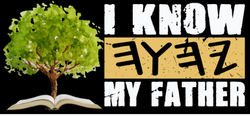Blind to Sin: A Journey to Genuine Reflection with YAHUWAH
Watch the Full Video Lesson Here:
Introduction:
In a world where mixed messages about sin and salvation are everywhere, it’s more important than ever to take a close look at our spiritual walk. "Blind to Sin" calls us to self-examine and make sure we’re truly aligning our lives with YAHUWAH’s teachings. Today, let’s dig deep and uncover why it’s essential to confront our personal weaknesses and cultivate a faith that’s both real and resilient.
Here are our favorite bible study tools. Click the link here.
Understanding Sin’s Impact
Sin isn’t just a concept or a simple wrongdoing—it deeply disrupts our relationship with YAHUWAH and puts distance between us and His guidance. Every one of us, no matter where we are on our faith journey, is vulnerable to falling short. Sadly, modern religion often glosses over this truth, leaving many believers unaware of how easily they’ve built bridges with sinful behavior. It’s like a friend constantly straying off the path without realizing the damage done until it’s too late. Scripture serves as that honest guide, helping us define sin when society’s moral compass feels lost. By fully grasping the impact of sin, we’re able to see how much we need YAHUWAH’s truth and strength to stay grounded.
The Danger of a Watered-Down Gospel
It’s easy to fall into the trap of feel-good teachings that many churches offer today. While uplifting, these messages often avoid the hard truths about sin and salvation, creating a diluted Gospel. Picture a buffet where every dish tastes bland; it doesn’t satisfy, and you leave feeling emptier than before. A watered-down faith works the same way—when our spiritual nutrition is lacking, we’re left vulnerable to misunderstanding salvation. This diluted message can mislead us into thinking that any path, regardless of our choices, leads to salvation. But true salvation requires us to walk a clear path, free from the false comforts that sugarcoat reality. The Gospel is our guide, offering nourishment and growth when it’s grounded in truth.
The Call for Genuine Self-Reflection
The story of King David gives us a real-life example of how easy it is to slip up when we let our guard down. Even as a faithful servant of YAHUWAH, David’s idleness led him to temptation and, ultimately, sin. How often do we catch ourselves judging others while we overlook our own faults? Self-reflection becomes our spiritual mirror, allowing us to see beyond our blind spots. By embracing humility and acknowledging our own weaknesses, we open doors to genuine repentance and meaningful change. This act of self-reflection is not about dwelling on past mistakes, but instead, using them as stepping stones towards a stronger, more honest relationship with YAHUWAH.
Idolatry and Its Modern Manifestations
Idolatry might seem like an ancient practice, but it’s alive and well today in many forms. When anything—money, status, even misguided ideas about “spirituality”—takes priority over YAHUWAH, it becomes a modern idol. We must remain vigilant against anything that slowly becomes a “substitute” for our faith. As Ezekiel 14:6 reminds us, we’re called to turn away from these idols for the health of our souls. Think of it like this: a small patch of mold can ruin an entire loaf of bread. Similarly, even small forms of idolatry can poison our faith if we’re not careful. Guarding against these modern idols keeps our hearts fully devoted to YAHUWAH.
Repentance, Not Regret: A Life Lesson
There’s a big difference between feeling regret and truly repenting. Not all sorrow leads to change—while regret can be momentary, repentance involves a complete shift in direction. When King David delayed his repentance, it brought turmoil into his household, showing us how ignoring our mistakes can bring lasting consequences. For us today, it’s important to remember that genuine repentance goes beyond saying sorry; it’s about committing to change. True repentance requires us to be fully transparent with YAHUWAH, recognizing our faults and taking active steps to align ourselves with His will. When we turn toward repentance, we’re not just erasing guilt; we’re transforming ourselves from the inside out.
Standing Firm Amidst Worldly Pressure
Living in today’s world means facing immense pressure to conform to what’s popular or easy. Standing firm in our beliefs isn’t always easy, especially when others around us might compromise. However, as true believers, we’re called to stand strong, even if it means going against the grain. Picture a situation where you’re the only one in a group choosing honesty, while everyone else bends the truth. It’s challenging but crucial for spiritual growth. When we prioritize obedience to YAHUWAH, we cultivate resilience and courage to stay true to our faith, even when it feels like we’re standing alone. In doing so, we not only strengthen our own faith but also become examples for others seeking something real in an often compromised world.
Conclusion:
Being “blind to sin” can lead us down a path of spiritual emptiness and misunderstanding. By consistently examining our hearts and striving for a deeper, more honest relationship with YAHUWAH, we gain clarity and resilience to navigate life’s challenges. Remember, our faith journey isn’t about pretending to be perfect—it’s about constantly growing, learning, and seeking genuine repentance. Let’s make this journey one of true reflection, where we fully embrace YAHUWAH’s love, stay vigilant against modern-day distractions, and remain committed to walking in His truth every step of the way.

